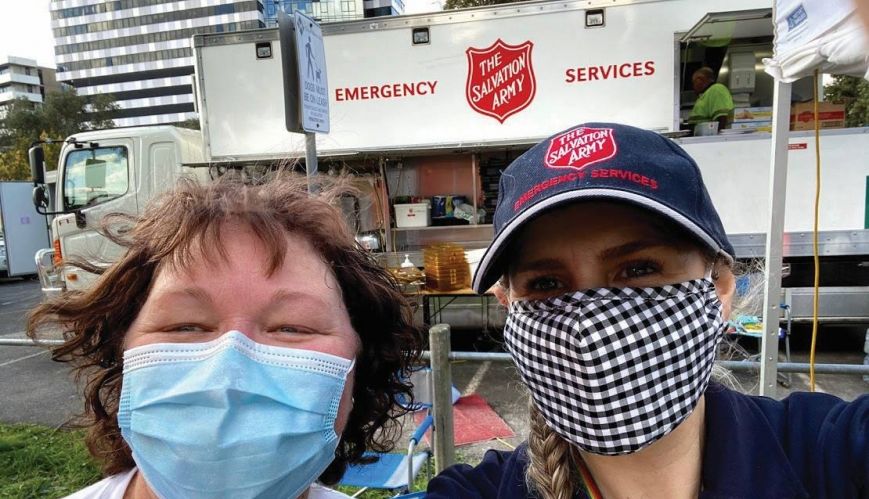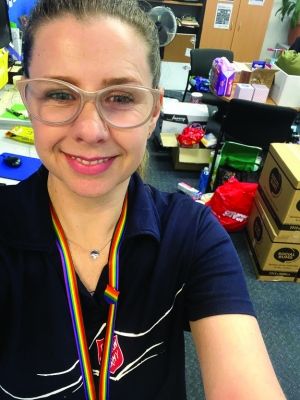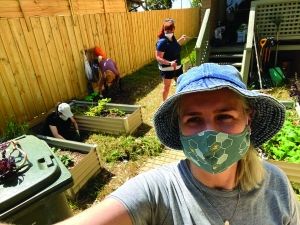The hidden faces of family violence

The hidden faces of family violence
25 November 2021
Captain Melanie Cop, family violence chaplain (pictured right), found going for walks during lockdown gave her the opportunity to talk with people.
Captain Melanie Cop is a Salvation Army officer and family violence chaplain. She visits women in refuges, safe houses, and those the Salvos support in local communities. In the 2020-21 financial year, the Salvos in Australia assisted more than 5800 women and children and provided more than 63,000 sessions of care to those at risk of, or experiencing, domestic and family violence (DFV). Salvos services include crisis, emergency, transitional and long-term housing, counselling, casework, outreach, and support.
“Everyone has a story,” Melanie says. “Some of the stories I hear are of triumph and overcoming, some are of sorrow and loss, and then there is everything in between. Women share stories with me of some of their darkest and most terrifying experiences – stories that keep them awake at night and bring terror in the shadows.
“I listen to these stories without judgement. Tears may flow, and I hold their hand, but the most valuable thing I can do is to be present. We want to provide hope, safety and care, but tragically, not all stories have a happy ending.”
 Melanie Cop, family violence chaplain.
Melanie Cop, family violence chaplain.
One of the refuges where Melanie works is a short-term stay centre. It’s the first point of call for women literally fleeing their homes and needing emergency care.
“The DFV team works with the police, hospitals, motels – whatever is needed – to make sure the women are safe,” Melanie explains. “The team arrange paperwork, crisis payments and longer-term accommodation. We look after the women physically and emotionally. We are there alongside them.
“Longer-term support may include being with a family in court, attending the police station with them to make a statement, or escorting them to appointments. Other days I might organise a birthday party, picnic, or back-toschool supplies. Each day is different.
“As chaplain, I offer spiritual care through prayer or study or offer a faith connection best suited to the person’s faith or belief.”
Melanie shares that her work is “both amazing and emotionally exhausting at the same time”. “I love being part of a journey and contributing in a positive way to that journey. It’s really important to me to see that the women are empowered, and not just enabled, and to see them grow in their own strength. It’s such a privilege to see them come from introverted and timid to confident and happy, to see that transition or the potential in each of the victim-survivors. I really do have the best job in the world.”
LOCAL SUPPORT
Melanie connects with women, children, and families from all backgrounds, cultures, faiths, the LGBTIQA+ community and those who are differently abled.
It’s not recommended for victim-survivors to stay in their local areas, so a large part of her role is to connect them with their new communities. In some areas, the refuges are well integrated with local Salvos churches. In non-pandemic times, the local teams involve and support the clients in activities such as women’s groups, playgroups, art therapy, coffee catchups, Christian yoga, and craft. They aim to help meet individual needs as well.
“During lockdowns, one of the churches offered free lunches, so I would walk down with one of our ladies having a one-on-one chat,” Melanie says. “The officer, Alison, would meet us and make us feel accepted and welcomed. Another church helped us with gardening projects, and we painted their wall in rainbow colours. So therapeutic!
“These churches also invite the women to Christmas activities and services, donate gifts to their children, and celebrate them as part of their family. All these activities give the women a sense of normality and some distraction as well.
“COVID-19 has been our biggest challenge in terms of not being able to provide safe human connection, hugs, and face-to-face contact. Language and culture barriers are also challenging – trying to support the women who don’t speak English well.”
CONNECTIONS
 Gardening is an enjoyable and therapeutic activity.
Gardening is an enjoyable and therapeutic activity.
The Salvos also provide an extensive network of social services that Melanie and her colleagues can tap into. “I’ve been able to refer people to homelessness services, detox and rehab support, Salvos Stores, and others,” she says.
“We also have extremely gifted officers who have skills in areas that have been so helpful in assisting women. Other churches pray for us and offer support also.”
Community connections for food resources, including SecondBite and OzHarvest, also play an important role in supporting the women. “Resources and budgets are one of our biggest challenges,” Melanie observes. “Government funding doesn’t cover our costs, so we rely on our Salvos Red Shield Appeal and community support.”
NOT JUST PHYSICAL
Melanie works only with female victim-survivors. “Men, infants to adult children, same-sex couples, the elderly, even pets, experience family and domestic violence – across all communities, ages, cultures and genders, although we know that women are disproportionately victims of family violence,” Melanie emphasises. “And perpetrators have many faces – partners, adults, children, neighbours, parents and grandparents.
“Violence can also present as intimidation, emotional, financial and spiritual abuse, coercive control, threats, gaslighting, manipulation and male privilege.
HOW TO HELP
If you have a ‘gut feeling’ that something is not quite right with a friend or family member, it’s important to check in with them,” Melanie advises. “If a woman suddenly goes off the grid and is not contacting her family or friends, it’s definitely concerning. So, too, are physical signs, depression, no available finances, having to ask permission to do things or being constantly checked upon.
“It’s not always about encouraging the woman to leave her situation; it’s about asking questions, knowing and communicating other options, and connecting them to the right services,” she says. “These services can give the women the knowledge they need to move in a positive direction. “If safety and well-being is an issue, then further intervention is required. This may mean calling 000 in an emergency.”
CARING FOR SELF AND OTHERS
On a personal note, Melanie is training in Forest Therapy – a practice that aids in dealing with trauma, grief, a range of mental health issues and general well-being, with time in nature. “It’s a ‘tree-hugging thing’ that involves absorbing the healing powers of nature to help people feel more relaxed and able to work through whatever they are experiencing in life,” she says.
“My work is really driven, and I need to recharge myself and take time out. Our clients do. We all do. Forest Therapy gives us all a chance to stop, focus, calm down and experience a sense of peace. These are some of the best gifts of life.”
Download file